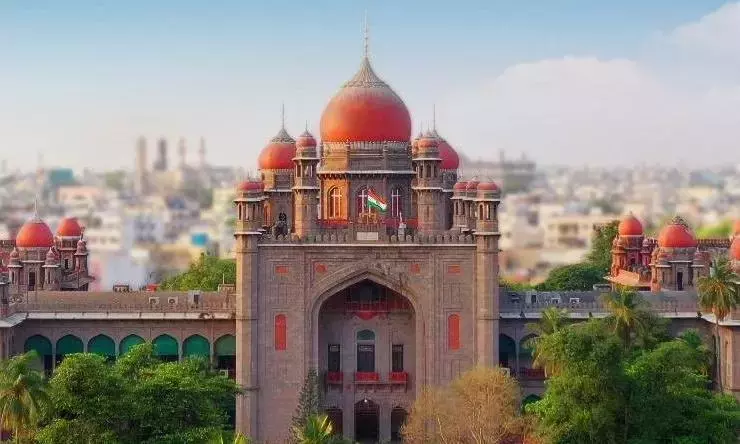Defamation case against Digvijay quashed
S.A. Hussain Anwar did not qualify as an aggrieved person, observed the judge

Hyderabad: Justice K. Lakshman of the Telangana High Court quashed a criminal defamation proceeding pending against Rajya Sabha member Digvijay Singh. The judge was dealing with a criminal petition filed in relation to the criminal proceedings initiated by S.A. Hussain Anwar, joint secretary of the AIMIM, alleging that Singh made defamatory remarks during a press conference, stating, “Mr Owaisi shall only contest elections where financial benefit lies.” The remarks, published in a local newspaper during the Tamil Nadu elections, were claimed to be damaging to the reputation of the AIMIM and its president, Asaduddin Owaisi. Counsel for the petitioner contended that the complaint lacked legal standing, as it was neither filed by Owaisi nor by an authorised representative of the AIMIM. It was also argued that the major portion of the statement in question was aimed at another political party and that only a minor part referred to Owaisi. The petitioner argued that Anwar, a joint secretary of the AIMIM, had no locus standi to pursue the defamation case. It was also contended that a similar defamation complaint filed by the same respondent in Nizamabad was dismissed and no appeal was preferred against that dismissal. During the hearing, the judge posed critical questions regarding the complaint’s direction, including whether the press which published the statements, could be prosecuted if the case proceeded and who would ultimately be held liable. The respondent argued that the comments were not just defamatory towards Owaisi but also the party as a whole and emphasised that he received numerous phone calls and faced public ridicule in response to the publication. However, the judge observed that the alleged defamatory statements were directed at Owaisi in his personal capacity and not against the complainant. The judge found no authorisation from the AIMIM authorising Anwar to file the complaint and held that he did not qualify as an “aggrieved person” under Section 199 of the CrPC. Citing previous judgments on the issue of locus standi in defamation cases, Justice Lakshman held that the proceedings amounted to an abuse of the process of law and lacked merit.
Notices to state for a Tribal Law College
A two-judge panel of the Telangana High Court comprising acting Chief Justice Sujoy Paul and Justice Renuka Yara ordered notices to the state in a public interest litigation (PIL) seeking a direction against authorities to issue orders for the establishment of Telangana Tribal Welfare Residential Law College. The panel entertained a letter addressed to the Chief Justice and registered it as a PIL. The PIL sought a direction to ensure that the state government complied with the Bar Council of India rules and granted recognition so that valid law degrees are issued. The panel directed the government to file its response within four weeks.
Woman accused in narcotics case given bail
Justice J. Sreenivas Rao of the Telangana High Court granted bail to a woman accused in a narcotics case involving a commercial quantity of amphetamine. The judge was dealing with a criminal petition filed by Subhani Begum. According to the prosecution, in November 2024, the police seized 125 grams of amphetamine from several accused. The petitioner was allegedly implicated based on the confession of another accused. Counsel for the petitioner argued that she had no direct role in the alleged offence and that she was falsely implicated. Counsel also highlighted that the petitioner and her husband were in judicial custody, leaving no one to attend to their two children. The judge observed that the petitioner was languishing in jail since November 2024 and had no prior criminal record. The judge deemed that it was a fit case to enlarge the petitioner on bail.
HC takes up plea for shops only for tribals at Jatara
Justice Pulla Karthik of the Telangana High Court took on file a writ plea filed by a hereditary temple priest seeking protection of tribal rights in allotment of shops at the Sammakka Saralamma Temple in Medaram. The judge was dealing with a writ plea filed by S. Lakshman Rao, a hereditary pujari of the Sammakka Saralamma temple at Medaram, Mulugu district. The petitioner alleged that non-tribal individuals were being permitted to operate shops on the temple premises in violation of constitutional and regulatory protections granted to Scheduled Tribes. The petitioner contended that despite filing multiple complaints, the Mulugu district collector and other authorities had failed to take action or respond. The petitioner alleged that the inaction of the respondent authorities facilitated illegal occupation of shops by non-tribal persons in a notified scheduled area, thereby violating the provisions of the Constitution read with the Fifth Schedule of the Constitution and the Telangana Scheduled Areas Land Transfer Regulation. The petitioner sought a direction to the respondent authorities to cancel the shop allotments to non-tribals and to issue a fresh public notification inviting applications exclusively from local Scheduled Tribe community members, in line with the protective provisions applicable to scheduled areas. The judge posted the matter for further hearing.

